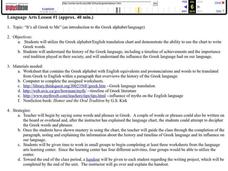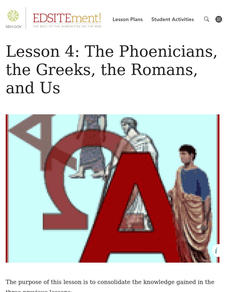National Endowment for the Humanities
The Greek Alphabet: More Familiar Than You Think!
In this Greek alphabet lesson, pupils explore the Phoenician origins to the Greek alphabet. Learners compare Greek letters to current letters and write a paragraph about the life of students in ancient Greece. They also identify Greece...
Curated OER
It's All Greek to Me
Introduce your class to the Greek alphabet and language. Examine how the Greek language influenced the English language. Study the history, timeline of achievements, and the role oral history played in Greece.
Curated OER
The Greek Alphabet
Tenth graders examine the history and origins of the Greek alphabet. They take notes while listening to a teacher-led lecture, and read and interpret common Greek words on the board. Students then create a decorated name plate with...
National Endowment for the Humanities
Lesson 4: The Phoenicians, the Greeks, the Romans, and Us
Learners review knowledge gained in the three-part unit on the history of the alphabet. Using maps and images, learners consolidate their understanding of ancient Greece, the Romans and the Phoenicians, and their respective impacts on...
Curated OER
The Olympic Medal: It's All Greek to Us!
Young scholars view a graphic of the Athens of 2004 Olympic medal. They discuss the symbols on the medal. Students view the "Greek Alphabet animation" and name the letters in the two Greek words on the medal, They transcribe Greek text...
Curated OER
International Festival: Greece
Young scholars celebrate the culture of Greece. In this multicultural lesson, students participate in several activities which examine the culture of Greece. Young scholars study the Greek alphabet, identify the country on a world map,...
Curated OER
The Alphabet is Historic
Students describe how the Phoenicians, Greeks and Romans passed down the alphabet through the generations. They compare and contrast the letters from early alphabets to the one of today and discuss how they are different. Using a map,...
Curated OER
Now You're Speaking My Language; Deciphering the Symbols of Early Civilizations
High schoolers explore early attempts at written language. For this early civilizations lesson, students investigate first attempts at written communication. Among the civilizations covered are Mayan, Greek, and Egyptian.
Curated OER
Hieroglyphics: It's Not Greek To Me! (It's Egyptian)
Students identify different hieroglyphic characters. They spell their name and write a sentence using them. They use online hieroglyphic translators as well.
Curated OER
Not Just for Gods and Goddesses:
Students use dictionaries, encyclopedias, art, computers, and books to study the Gods and Goddesses of Ancient Greece. In this Ancient Greece lesson plan, students research maps, stories, Olympic games, and more about Ancient Greece.
Curated OER
The History of Writing
The history of written communication can be an interesting addition to history lessons.
Curated OER
Colonial Life
For this colonial life worksheet, students read a 1 page article on colonial life, make a Venn diagram that shows how life for colonial children was different from and similar to theirs and discuss what part of colonial life they liked...













